|
"I JUST WORK HERE"
One night with Elvis.
I wouldn't, in the
normal scheme of things, describe myself as an Elvis Presley fan.
After a brief dalliance with glam rock (in the shape of The Sweet)
in the early 70s, it was punk that really awakened my interest in
music, and Elvis died just as punk broke, so he never meant anything
to me while he was alive. And when you look back at his career from
the perspective of the present day, the good bits make up a tiny
proportion of the 20 years it lasted. For 95% of that time, Elvis
was a puppet in the hands of his manager Col. Tom Parker, who
squandered what it turns out was probably the greatest natural
rock'n'roll talent of all time making cheesy movies and then
becoming a tragic cabaret act - doped to the eyeballs, dressed like
a Christmas-tree fairy and searching in desperate bewilderment for a
faintly-remembered spark of burning soul from a distant past, whose
occasional brief flickers through the Vegas sludge only served to
illustrate the tragedy all the more painfully.
So if Elvis was
crap nearly all the time, how do we know he was probably the
greatest natural rock'n'roll talent of all time? Because, chiefly,
of Elvis - One Night With You.
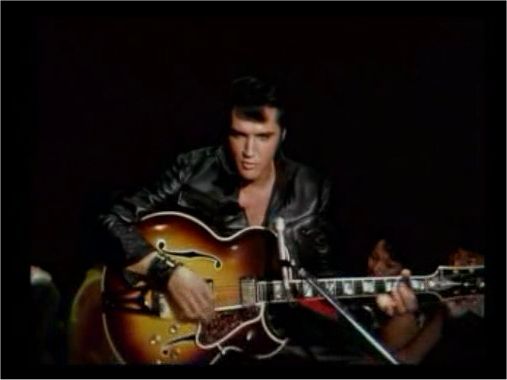
Sorry, ladies - he's dead.
The 1968 Comeback
Special is generally held up as the definitive example of Good
Elvis. A made-for-TV extravaganza (which wasn't actually called the
"Comeback Special"), it briefly resurrected Presley's career after a
load of terrible hack movies had sent his rock'n'roll reputation
plunging almost out of reach into the dumper. The Special showcased
many elements of the 1968 Elvis - there were big glitzy dance
numbers, white-suited gospel sections and all sorts, but the heart of it is a
handful of breathtaking "unplugged" performances by Elvis and some
of his band, seated on stacking chairs on a tiny stage like a boxing
ring in the middle of a small audience.
This performance,
removed from the rest of the Comeback Special (in which only a small
fraction of it was included) and depicted many years later in a separate US TV
show and subsequent video release in its unedited
entirety, is what makes up
Elvis - One Night With You. It's probably the greatest piece of
unadulterated, pure rock'n'roll ever committed to film. Join your
reporter now on a guided tour.
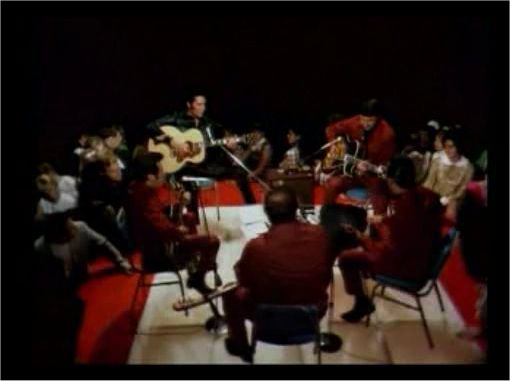
Rock'n'roll Babylon.
Elvis, in a tight
black leather suit, holds court with four old session guys in red
garage-mechanic-style overalls. Two of them (and Elvis) have
guitars, one plays bongos, and the last (Elvis' long-serving drummer
DJ Fontana) plays drums on a guitar case resting on a small table
between the players, as if they were all just rehearsing in a small
living-room. (Next to Elvis is his veteran guitar player Scotty
Moore, and the other two musicians are Elvis' long-time friends
Charlie Hodge and Alan Fortas, but this reporter is sadly unable to
relate to minor-detail-loving viewers which one's the guitarist and
which is on the bongos.)
A younger man,
never introduced and not dressed like the others, kneels on the
steps at the edge of the stage and bangs a tambourine in time with
the drums. (It's never made clear if he's part of the band, the
studio floor manager, an audience member, the pizza delivery guy or
what.) Add a few textbook clean-cut young adults (this isn't a teeny
screamer audience, as the Comeback Special was aimed at restoring a
certain amount of grown-up artistic gravitas to Elvis' image) and
the picture is complete (alternatively, you could just look at the
pictures). Which leaves us only the performance to talk about.
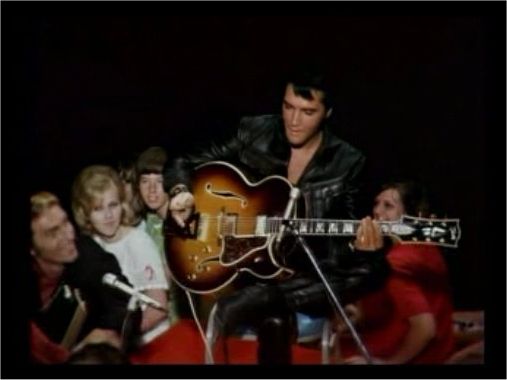
The blond man at bottom left is Mysterious
Tambourine Guy.
(Later immortalised by the Byrds in "Hey, Mysterious Tambourine
Guy".)
From the opening
seconds, One Night With You is a thing of beauty. Even a cheesy,
bizarrely-punctuated voiceover intro only seems to add to the
atmosphere, and from the minute Elvis and the band arrive onstage
everyone seems relaxed and happy. There's a couple of minutes of
warm, chatty intro and banter, then without any ceremony the band
kicks into "That's Alright Mama", an old blues standard that's
rendered with an easy playful charm that doesn't quite conceal the
raw fire in its heart. Then it's straight into "Heartbreak Hotel",
Elvis occasionally getting up off his chair to knowingly-obliging
squeals from the audience or pretending to forget the words, and
everyone's having a great time already.
The smoky
crooner-ballad "Love Me" is next up, showing off Elvis' rich,
reverberating baritone to great effect, but the casual, gently-paced
start to the show's about to come to an end. At the end of the short
song, Elvis swaps his acoustic guitar for Scotty Moore's beautiful
big sunburst Gretsch electric, and the heat's turned up a little
with the feral stomp of "Baby, What Do You Want Me To Do?".
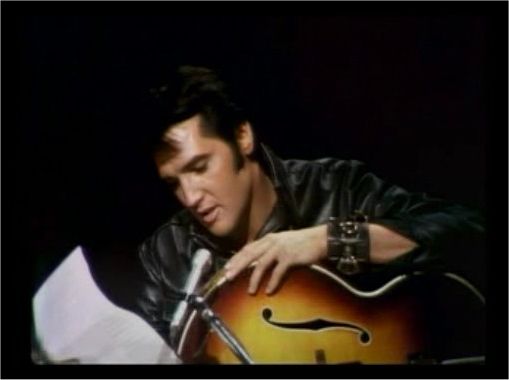
The Elv reading theatrically from the "script".
But it's a tease -
after it's finished, Elvis picks up his set instructions and embarks
on a pisstake of them, then starts on a curiously serious and
seemingly improvised monologue about the state of music,
("Everything's improved") how he enjoys the new groups like
"The Beatles, The Beards, and the... whoever" but how
rock'n'roll is basically just a derivative of gospel and
rhythm'n'blues, and how... the audience is gazing in rapt attention,
hanging on every word and waiting for the point, but then just as
it's getting interesting he slyly gives up on the ramble, links
slickly into "Blue Suede Shoes" with a little in-joke that
the band get before everyone else and we're off again.
It's after "Blue
Suede Shoes" that the show really catches light. Jamming
inexplicably back into "Baby, What Do You Want Me To Do?", Elvis
breaks the song off after the first chorus, complaining that
"There's something wrong with my lip". This is the excuse for an
anecdote about the infamous restrictions imposed on his early TV
performances, and the first of several oblique and not-so-oblique
references to the unwanted demands made by Col. Parker on Elvis'
career direction (especially the terrible films). This is candid
stuff, and the first sign that this is the real Elvis we're
watching, relaxed and intimate among friends and doing the only
thing he really wants to do - play simple old rhythm'n'blues rock'n'roll, for himself and for
his fans, and with his best and trusted buddies beside him.
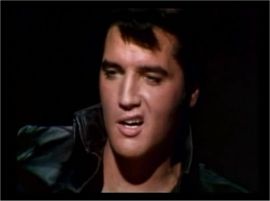 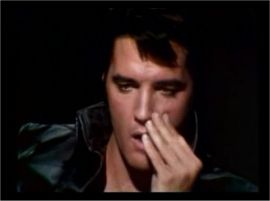
"I got news for you, baby", reveals Elvis. "I
did 29 pictures like that."
At this point, that
rock'n'roll takes the form of the ferocious, lustful "Lawdy Miss
Clawdy", another blues standard in much the same vein as the earlier
songs (in fact, the tune is all but indistinguishable from "Baby,
What Do You Want Me To Do?"), and for the first time Elvis really
lets his voice go, as if released and empowered by speaking a
long-bottled-up truth.
It's followed by
the jauntier, poppy "When My Blue Moon Turns To Gold Again", but
just 45 seconds in, Elvis realises he's supposed to be doing a
different song and cuts it short to go straight into "Blue
Christmas". It's a charged rendition, Elvis suddenly short on the
big smiles that have punctuated the performance so far and staring
at the floor for most of the song, as if realising that the earlier
display of dissent might not have been such a smart move.
This (whether real
or merely invented by the over-imaginative viewer) internal
conflict, though, finds stunning voice in the next song. Suddenly
reinvigorated, Elvis delivers an incendiary, primal version of the
powerful torch-blues of "Trying To Get To You" that marks the start
of the show's most spine-tingling section. He gives the song
everything, provoking spontaneous applause from the audience in the
middle as he howls the song's yearning lyrics like they're the most
important words anyone's ever had to convey. The song seems to have
a physical hold on Elvis, pulling at his arms and forcing him up out
of his chair on several occasions, hips swinging in spite of the
lack of a guitar strap making it impossible to stand up properly. As
it comes towards its end, he urgently growls "One more time, one
more time, one more time" and the band obligingly and seamlessly
carry on for an extra chorus.
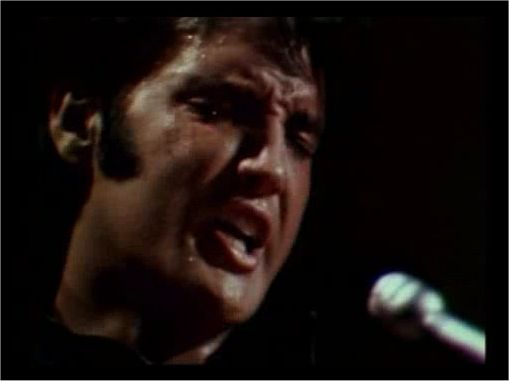
Trying to get to us, and succeeding.
As he turns the
intensity up another notch and shakes his guitar like a fist, it's
easy to imagine that the song's lyrics are now about Elvis' own
life, his much-frustrated and delayed journey to be right here,
right now, just singing his rock'n'roll songs to us - "There was
nothing that could hold me! / Or could keep me away from you!" -
and free for a single blissful moment from the grisly circus run by
the overbearing Parker. Unable to keep the song going any longer,
Elvis plunges without pausing into the next number, the slower but
equally taut "One Night With You" that gives the show its title.
He's still in the music's grip, grimacing and twitching and shaking and jerking
out of the chair like a rag doll every time the song peaks in the
choruses between the ballady verses, and extending it with more and
more choruses as if he never wants this perfect moment to end.
There's an
incredible bit near the song's usual finish, when an audience member
knocks out the lead of Elvis' electric guitar, and the song stops
dead. With the minimum of fuss, Elvis plugs back in, and with a
quick "What I was gonna say was - " dives straight back in
and picks up exactly where he left off without losing a single iota
of the song's built-up power or fearsome drive, and then seizes the
excuse - "Gotta do it again now, I'm sorry" - to get in yet
another refrain of practically the whole song, building to an
electrifying climax where it looks like the whole band are going to
get up and rock the place right to the ground, only for Elvis'
missing strap to bring him back down to Earth and the rest of the
band with him.
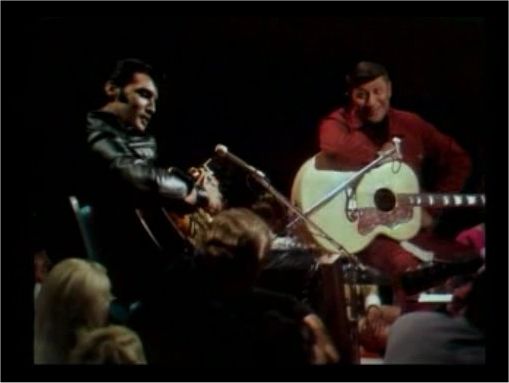
Scotty Moore shares a joke about bad wigs.
But they're set free
now, undaunted by such trivialities and doing whatever the hell they
please, so Elvis leads the band straight into "Baby, What Do You
Want Me To Do?" for a we-don't-give-a-fuck third time
(maybe playing this particular tune three times in the show is a
coded or spontaneous message of exasperation aimed at Col. Tom
Parker and the other malign influences in Elvis' life, but probably
more likely they just love the song) and they tear the place up,
stamping the floor like bulls and yelping and growling their way
through the song like nothing else in the world will ever matter. It
goes on and on, longer than the two
previous renditions put together, until it seems to put everyone,
band and crowd alike, into some sort of a hypnotic trance.
An instrumental
break at the end of the song seems to stop time, everyone just lost
in the primitive repetitive single beat of the music and locked into
an endless groove, until finally someone remembers to do the last
chorus and bring the thing to an exhausted, sweating halt, Elvis and
the other guitarist sharing a knowing look as they croon the last
lines softly across the stage at each other, because they've
realised that nobody's ever been this good before and nobody will ever be
this good again - they own the soul of rock'n'roll forever.
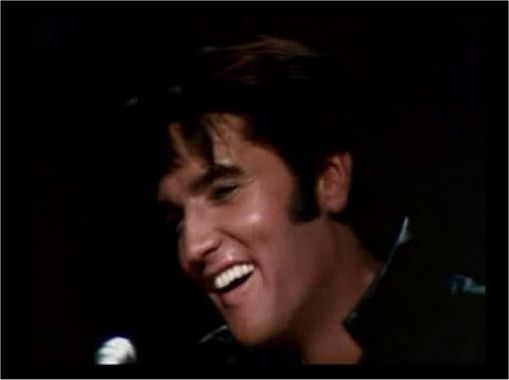
Happy Elvis.
The show proper is
effectively over at this point, and as everyone gets
their breath back after the thrilling scenes they've been witnessing, Elvis is momentarily lost for words, stammering
"Uh... uh... what? Help" in the quiet moments after
"Baby What Do You Want Me To Do?" has finally come to an end
for the last time. As if belatedly remembering where
he is, he gathers his thoughts and tells the audience that there's
only one more song to come, as "There's another audience waiting
to come in" (the other audience being presumably for the
recording of one of the other, stagier sections of the Special).
As a loud groan
goes up from the disappointed crowd he makes his
excuses in a jokey comment, but one that's also loaded with meaning
and sadness
reflecting how rarely the world's biggest star actually gets to do
what he really wants to do - "Man, I just work here!" - and the band get ready
for the last number. Elvis decides he's going to put a strap
on his guitar and stand up, but it transpires that there's no strap
to be found. A hurried discussion follows, and one of the guys
suggests Elvis could rest his foot on the chair and balance the
guitar on his knee and still be able to put out some hot
pelvis-thrusting action.
The other guitarist
puts down his instrument and hastily enters service as a mic stand,
holding up Elvis' microphone (set for a sit-down performance) at
stand-up singing height and there's a second, apparently
spontaneous, rendition of "One Night With You" that starts off as a
joke with improvised lyrics about the missing strap but turns into a
stirring, hip-swinging farewell, with beaming grins on everyone's
faces as they show the world how it should be done, just one last time.
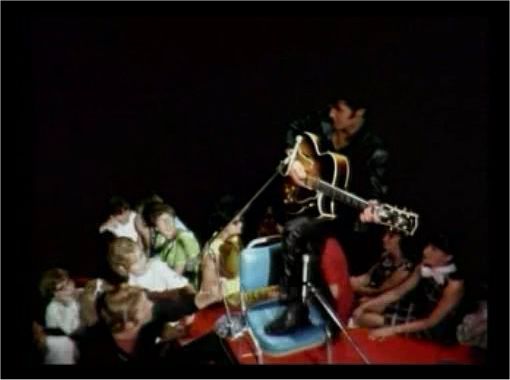
"I wish I'd brought a smaller guitar."
Annoyingly, though, it's not actually the last song of the show -
there's a pre-arranged, pre-recorded version of the slushy ballad
"Memories" for Elvis to croon along with, bizarrely out-of-place
among the raw blues classics heard up to now and lending the show a
weird, unsatisfying endpiece as the music barges in long before the
applause for "One Night With You" has faded away and the band are
hustled off into the shadows without a goodbye, evidently having had
so much fun jamming with the boss like in the old days that the
show's running time is now under severe pressure. It seems like a
metaphor for Elvis' entire life. "Memories" ends
abruptly and the credits - complete with Elvis' name misspelt -
roll.
Elvis - One Night
With You is a fantastic rock'n'roll performance in its own right,
but it's everything else it stands for and carries with it that
makes it one of the great cultural documents of the television age.
It's perhaps the only recorded instance on film of Elvis doing the
thing he was born to do, freed from the crushing weight of
contractual obligations with which Col. Tom Parker almost destroyed
him. It's a record of someone lost in sheer joy, doing what he loves
most surrounded by people he loves; totally relaxed yet at the same
time radiating raw sexual tension like an exploding star radiates
raw fire and light. And it's pretty debateable whether any human has
ever looked as good as Elvis does in this show.
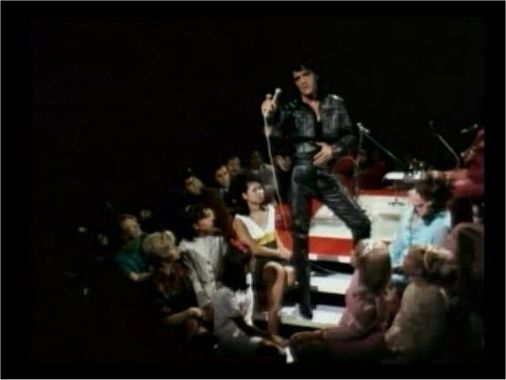
Do my hips look big in this?
And yet there's
more. This isn't some invincible god putting on a performance, this
is someone unselfconsciously sharing their true personality, which
just happens to be as magnetically watchable as a fireworks display
at the end of the world. There are glimpses of vulnerability, candid
nods at the darkness that this night is a release from, an
acknowledgement of a man's lack of control of his own life, all the
wasted years when Elvis could have just been doing this instead of
throwing his incredible talent away on making cheap bucks for evil
manipulators. It's a microcosm of the story of every artist ever
chewed up and screwed up by the music industry, a parable of the dangers of letting
parasites, middlemen and beancounters hold sway over the creative
and the gifted. (That the warning still hasn't been heeded nearly 40
years later only adds extra poignancy to the story.)
But you don't have
to be looking for cultural or socio-political significance to be
thrilled like a kid at Christmas by One Night With You. The first
time this viewer saw it, he had to watch it through the gaps in his
fingers, because the sheer overwhelming natural power of it was like
looking at the sun during an eclipse - trying to take the whole
thing in at once would just have overloaded and burned out the
senses. If you've seen it and disagree, get them to dig a hole for
you now, because there's nothing left for you to see in this world
that'll touch your cold, dead heart. (You don't need to like Elvis
or the songs to see the beauty in this film.) And if you haven't, you need
to.
The VHS release of
One Night With You has been out of print in the UK for years, and
it's never come out on DVD here, but - well, World Of Stuart is sure
it doesn't have to tell you where to
look for things like
this that nobody will sell you honestly. And with the man dead for
nearly 30 years, the parasites who killed the golden goose in the
first place have made enough money from his living body and his
corpse already. Elvis - in this performance especially - belongs to
the world now. The world should take care not to lose him again.
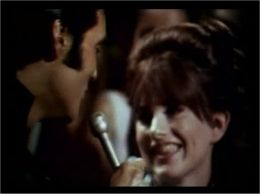 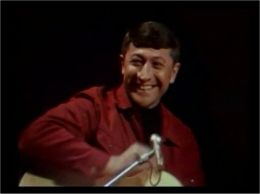
Is everybody happy? For now, yeah.
|

